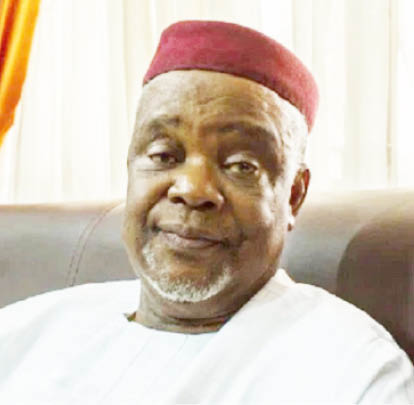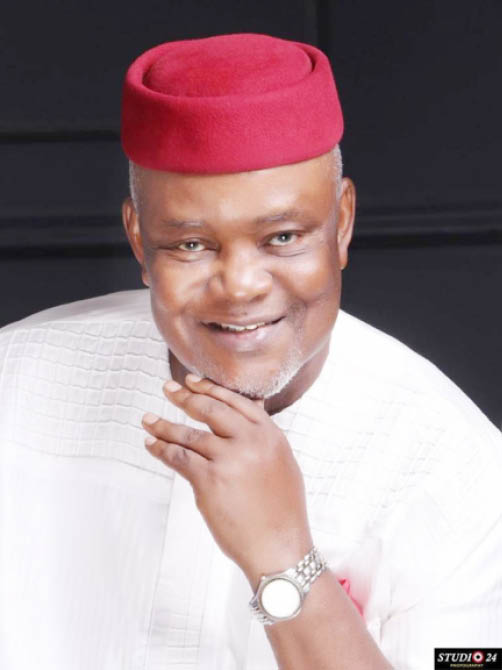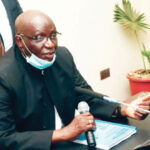Professor Ihechukwu Madubuike is a member of the Igbo Elders Forum and a former minister of education during the accord government formed by Nnamdi Azikiwe’s Nigerian Peoples Party (NPP) and Shehu Shagari’s National Party of Nigeria (NPN) in the Second Republic (1979-1983). He also served as Nigeria’s Minister of Health under the regime of former head of state, General Sani Abacha in the 1990s.
In this interview, Prof Madubuike revealed how he helped expand the space for higher education in Nigeria during his tenure as minister. He also spoke on the security situation in the South East, the 2023 general elections and other national issues.
How was your childhood?
I was born to peasant parents – my father was a carpenter and my mother a farmer in a rural setting, with occasional sorties into towns. I lived with my parents in the town and partially in the village with my grandparents. At a time, my father worked at Shell BP and later joined the military in Lagos. He fought in World War II in Burma (Myanmar) around the time when I was born.
We lived in Lagos, Owerri and Port Harcourt when he came back from military service. I later went to be with my grandparents in the village to learn the ways of village folks.
While in the village, Isuochi, I went to farms, fetched water from the streams and did what village boys did. I ate village foods, learnt how to be initiated into some of the masquerade societies, and learned our cultural values. Hard work and manliness were appreciated and laziness was frowned at.
The Scorpion cult came about when the deadly insect bit me and friends showed me how to treat snake bites with local herbs. I learnt how to shoot the bow and arrow. I also learnt the uses of some local herbs for medication. One day I was bitten by a scorpion and I cried from the farm to the house. The village lads laughed at me, calling me a “city boy”, who did not know how to handle scorpion and snake bites. They eventually initiated me into the Scorpion cult. They taught me how to catch and play with scorpions. All they did was get a blade and did an incision, squeezing the liquid of some leaves into the incision. I became immune to scorpion bites. We set traps for rats and rabbits and sometimes snakes would come out of the holes. You can find some of these narratives in my memoir, which was published some two years ago.
I attended primary school in the village before I went for secondary education in Calabar. Practically every educated man in Calabar and its environs attended Duke Town Secondary School, founded by a man called Hope Masterton Waddel as a primary, junior and technical secondary school in 1846. Mary Slessor was buried at the site of the school – Mission Hill.
From Alvan Ikoku College of Education, I had a scholarship that took me to Canada, France at the Sorbonne, and to the USA.
Now, I run my polytechnic, the Ihechukwu Madubuike Institute of Management (IMIT), Isuochi, Abia State in pursuit of my vision for the technological advancement of Nigeria. It is accredited by the National Board for Technical Education (NBTE). And we are working hard with some foreign institutions and doing special courses with Microsoft, MSN and others. We have done our first matriculation. We have a staff secondary school.
What is the difference between when you first came into government and the present crop of leaders?
When the Igbo came back from the war in the 1970s there was an enthusiasm to recapture the years they had lost. We were given 20 pounds out of all the money we had in the banks. It required special ingenuity to transform the 20 pounds into hundreds of pounds. Today, Igbo land is the home of many millionaires. At that time, the naira was stronger than the dollar. I remember that as a commissioner for finance in the then Imo State, I could go to London with N400. I could travel from Port Harcourt to Lagos with N36 by air.
Successive military interventions brought a lot of changes and all kinds of theories about our economy. From floating or selling the naira to other countries and other esoteric tinkering with the currency, the national currency started tumbling, and nobody has been able to stop the fall.
The military boys boasted that Nigeria had a lot of money and saved nothing. And so, they didn’t know what to do with the excess crude oil money they had. They brought into governance all sorts of impediments that eventually stalled growth and development, especially human development. There is corruption, especially of the mind – the inability to understand that you cannot continue to do things the same way all the time. Economic leadership also eluded us, not just political leadership. And we are still suffering from these aberrations.
There was a time, before 1999, when we had over 90 industries in Anambra and Abia alone. But with systemic corruption and leadership inertia, those industries have gone under. I still see some of the carcasses when I travel from Port Harcourt to Aba. The PRODA in Enugu, taken over by the federal government, is a shadow of itself. Neglect is a disease that has not spared any part of the country. The vehicle production plant at Bauchi was forgotten. Others like the Volkswagen plant in Kwara State, and the Peugeot Assembly Plant in Kaduna have all been outsourced to other countries.
As a minister in the Second Republic, we were proud to use these home-assembled goods. They were good and affordable. It was unpatriotic to use imported vehicles in government offices. Suddenly, the low-profile policy of the day disappeared. It all has to do with the challenges of leadership.
Today’s leaders seem to have forgotten why they aspired to leadership, consumed by their consumption appetite that seems to have no bounds. Development seems to be their least concern. The welfare of the people is relegated to the foreground. Very few of them know what development means in real terms.
What did you and the administration you served accomplish in education?
When I became the minister of education in 1979 under the Shehu Shagari administration following the accord between the NPP and the NPN, I gained more insight into the challenges of education as a viable tool for human and societal development. I immediately embarked on a remedial process. With a National Certificate in Education (NCE), a bachelor’s degree in Philosophy and other diaspora experiences in education, I was on a familiar ground in the ministry.
One of the problems we had was placement of students. Many Nigerian students were needlessly denied admission into our higher institutions because of the limited capacities of the universities to absorb them. The case of Imo was pathetic.
At that time, Imo almost always had the highest number of students taking the Joint Admissions and Matriculation Board (JAMB) examinations; ditto for Anambra, Ondo, and the former Midwest region. Some of these states had universities, but the highest institution in Imo was the Alvan Ikoku College of Education.
Building collapse: FCT minister orders arrest of FHA officials, developer
When a nation dances around its problems
Following my appointment, Chief Mbakwe wrote to me, stating that my name would be written in gold if I brought a university to Imo State.
But it was at a time the Obasanjo military administration said no higher institution was needed in the country anymore. There were 13 universities at that time and we had 19 states. Six states did not have universities, including the Federal Capital Territory (FCT). Aguda House was the Aso Rock of that era.
I told President Shagari that the military position as contained in the Fourth Development Plan could not be entertained in a democratic dispensation. Ours was a presidential system of government and we had to change and democratise education. I explained to him that we had to start more universities in specialised areas like science, technology, and agriculture. I told him that every state must have a federal university as a policy. We needed mission or specialist-oriented universities.
He said I had to convince him and my colleagues. So I took my idea to the Executive Council through a memorandum. It was debated and carried. Universities of science and technology were approved for the states that had no universities. A conventional university was approved for the FCT. So, I started the first three universities of science and technology in Imo, Gongola and Benue. Others would follow when the budget for them was approved.
I explained that less than 10 per cent of the youth who sat for JAMB examinations got admitted into the universities; hence we needed an open university in the country. I told him that at the last university where I taught in the USA, the Ohio State University in Columbus, one campus had

over 50,000 students, whereas the 13 universities in Nigeria in 1980 could not muster up to 30,000 students or thereabouts despite many students who qualified for admission. So, the first thing I did was to make Alvan Ikoku College of Education, Owerri, Adeyemi College of Education, Ondo and another college of education in the North degree-awarding institutions and attached them to nearby universities.
The National Open University of Nigeria (NOUN) didn’t quite take off before I left office, but I had sent the draft bill to the National Assembly and appointed a three-man committee to work out the details of the project. We also visited Milton Keynes in England and Siri Lanka to see how the open university system worked. Professors Ojo (Ife), Afigbo (UNN), and Aminu Dorayi (ABU) were the committee members.
The NOUN eventually started. Most of the products the committee used to start up their programmes are still in my house. If you met four graduates in the United Kingdom (UK), one of them was a graduate of an open university. Today, I am proud to say the National Open University of Nigeria is the largest because they have campuses all over the place.
We introduced another important factor to further democratise education in Nigeria. We allowed the states and the private sector to come in. States that had the resources were given licenses by the National Universities Commission (NUC). That is how state universities started. The Imo State University; Anambra State University of Technology (ASUTECH), Benue State University and Lagos State University (LASU) started following guidelines provided by my ministry through the NUC.
I believe the government has to support private universities because they are in the same market, providing manpower for the development of individuals and the society.
As an elder in the South East, how are you engaging the youth over the insecurity in the zone?
It is difficult to know those causing the havoc and killings in the South East today. We meet with normal youths from time to time to tell them the importance of peace These are the kind of mentoring we elders engage in, believing that no condition is permanent. We engage these youths to prevent them from thinking that banditry or violence is a preferred route to achieving lasting goals. It is a battle of the mind.
Are you reaching out to criminal groups linked to some of the violence going on in the zone?
The matter would have been easy if you knew the criminals. An appeal to traditional rulers to thoroughly look into their domains for persons of questionable character and report to the police is still on. We are also dealing with all youth organisations that are disposed to dialogue, and we believe that through peer pressure, other groups would get the information. When they begin to take part in decision-making, the situation will return to normalcy. It is a gradual process, but the important thing is that we are talking. And they are amenable to talking and seeing an alternative to violence.
Do you subscribe to the belief that leadership failure is responsible for the escalation of violence?
There is no doubt that leadership failure is responsible for the state of anomy we are experiencing, not just in the South East but in the country. I think the thing is now known to everybody that there are sovereignty, capability, security, employment and democratic dividend gaps. We are sharing our country with bandits or people who don’t have authority and we call them non-state actors. These are signs of governance failure. There is no better way to describe it. When you have criminals you can no longer tame or control, that is a sign of state failure.
How do you see the situation in Nigeria today?
Nigeria today is a dystopian society. The military administration should not successfully impose a constitution made based on its view of the society and ask civilians to implement it. That’s where our problem lies. When the military was in power, nobody interfered and they did as they liked, inviting whoever they wanted to work with. It was seen by some as a risk not to work with them. There is a US congressional report that came out this year by the Harvard Kennedy School of Politics stating that Nigeria has gone from a weak to a failed state. That is how low we have fallen. The worst failure is that we don’t realise that we have failed.
In 2023, none of the major candidates has a military background; don’t you see this as a new hope for Nigeria?
They may not have military backgrounds but some have imbibed military culture. When the mother hen is eating, the chicks imitate. Besides, the dress does not make the priest.

 Join Daily Trust WhatsApp Community For Quick Access To News and Happenings Around You.
Join Daily Trust WhatsApp Community For Quick Access To News and Happenings Around You.

